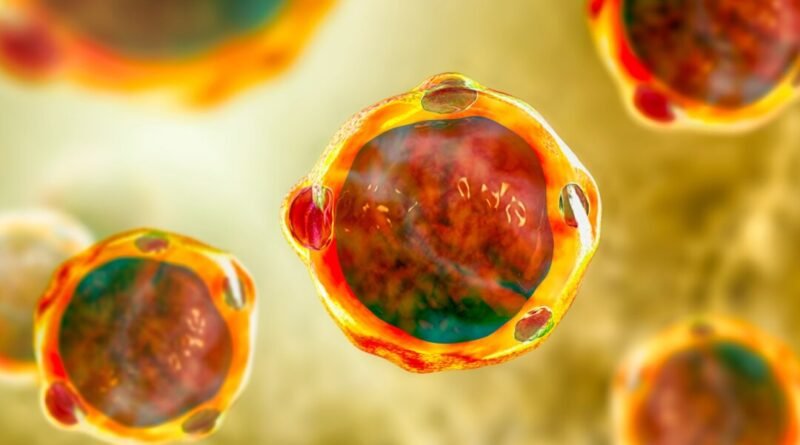Blastocystis: Uncovering the Surprising Health Benefits and Controversies of this Gut Microbe
The study revealed that Blastocystis has been a challenging microbe to investigate, but new evidence suggests a connection between this microbe and a healthier diet, as well as improved cardiometabolic health.
Blastocystis is a single-celled organism known to cause intestinal infections and can be fatal in individuals with weakened immune systems, such as those with HIV. Nonetheless, the parasite is also present in asymptomatic individuals, often referred to as carriers of the disease blastocystosis, leading to debates among scientists about its potential harm or neutrality towards humans.
Recent extensive research has shown promising aspects of this gut bug. It has been discovered in the stool samples of healthy individuals and is associated with beneficial biomarkers and diets rich in whole foods.
Positive Impacts on Health
In a study published on July 8 in Cell, researchers analyzed the microbiomes of over 56,000 individuals worldwide through their stool samples. Blastocystis was associated with favorable cardiovascular and cardiometabolic markers, including enhanced lipid and glycemic profiles, and lower BMI.
The gut microbiome consists of numerous microscopic organisms, including bacteria, fungi, viruses, and parasites, representing thousands of species. These microbes contribute to physiological functions and immune protection, creating a largely symbiotic community.
Francesco Asnicar, a professor at the University of Trento in Italy and corresponding author, emphasized the importance of research to determine whether Blastocystis is detrimental or beneficial to human health.
“Our findings provide new insights into the intricate relationship between the human gut microbiome, diet, and cardiometabolic conditions involving the often disregarded Blastocystis species,” the researchers noted.
They further explained, “In the future, tailor-made nutritional interventions aimed at altering gut ecology could serve as a feasible strategy for preventing diseases. Our research indicates that underappreciated non-bacterial taxa can play significant roles in preserving and enhancing human health.”
As of now, it remains uncertain whether Blastocystis directly enhances health. However, its presence is correlated with improved gut health.
Mr. Asnicar observed that the study suggests individuals with better diets or lifestyles—along with stronger overall immunity—do not seem to react negatively to Blastocystis.
Infectious Properties of Blastocystis
Blastocystis has traditionally been associated with infections that one would want to avoid. The parasite has been blamed for causing symptoms like diarrhea, stomach pain, weight loss, constipation, excessive gas, and anal itching, according to the U.S. Centers for Disease Control and Prevention (CDC).
The infection is often seen in international travelers who were exposed to Blastocystis in another country or individuals exposed to someone who recently traveled, as stated by Ken Boorom, director of the Blastocystis Research Foundation. Formed in 2006 by patients and their families, the foundation aims to advance research on this parasitic infection and educate physicians on antimicrobial treatments.
Mr. Boorom mentioned in an email to The Epoch Times, “Some individuals contract and clear Blastocystis infection spontaneously without any symptoms, while others suffer from persistent illness upon exposure. Genetic susceptibility could also play a role in developing the illness.”
A Debated Organism
One article published in Parasitologia highlighted the controversial nature of Blastocystis, with researchers unable to definitively determine its pathogenicity and transmissibility.
Researchers explained, “Some suggest that Blastocystis directly causes gastrointestinal disorders and is associated with particular types of persistent diarrhea, stomach pain, and vomiting. The presence of Blastocystis in immunocompetent individuals is not consistently linked to gastrointestinal symptoms. Conversely, immune-compromised persons (e.g., those with cancer or HIV) seem to be more susceptible to the parasite.”
- Contaminated surfaces touched by feces from an infected person or animal
- Ingestion of water, including swallowing water from pools, lakes, bathtubs, rivers, and springs
- Consumption of undercooked or raw contaminated food
- Direct contact with an infected person or animal
The CDC provides the following recommendations to prevent infection:
- Regularly wash your hands, especially after touching animals and soil, and before handling food.
- Rinse produce before consumption.
- Avoid consuming water or food suspected of being contaminated.
- When traveling abroad, steer clear of consuming uncooked foods and tap water.
Origin of Blastocystis
The Cell study noted that Blastocystis is rarely present in newborns, indicating that it is acquired later in life. The researchers also believe that it is not a recent addition to the microbiome, as they detected it in stool samples dating back to 595 AD.
Mr. Asnicar elaborated, “It is not a transient organism passing through the gastrointestinal tract. There could be specific foods or gut conditions that encourage the microbe to establish itself in the gut microbiome, which could be areas for further investigation.”
The study also revealed that diet can influence the presence and abundance of Blastocystis.
In the final phase of the research, 1,124 individuals participated in a tailored diet program to observe the changes in Blastocystis levels in their microbiomes before and after significant dietary improvements.
- Fifty-seven individuals acquired Blastocystis, with a higher consumption of dietary fiber and fat but not protein and carbohydrates. Their diets also contained more fiber compared to those who either lost or did not experience changes in Blastocystis levels.
- Twenty-nine individuals lost Blastocystis, while 323 remained positive for Blastocystis before and after the diet.
- Those who tested positive for Blastocystis at the beginning and end of the study experienced an increase in abundance.
- The individuals who were both Blastocystis-positive and improved their diet showed a significant reduction in BMI.
- Those who acquired Blastocystis during the trial also experienced an enrichment of other species in their microbiomes associated with improved health.
- Those who lost Blastocystis also experienced a reduction in microbiome diversity.
Mechanism Yet to Be Uncovered
While the association has been identified—and despite contradicting evidence regarding the infectious nature of Blastocystis—Mr. Asnicar mentioned that the reasons why the organism seems to benefit some individuals while causing issues for others remain unknown.
He pointed out that this scenario might be reminiscent of Escherichia coli (E. coli), often associated with disease, despite most E. coli strains being beneficial to our gastrointestinal tract.
Mr. Asnicar stated, “There could be subtypes of Blastocystis that react with inflammation when triggered, while others do not. This raises the question: Why does this happen? There is still much to be discovered.”
While the Cell study investigated eight subtypes of Blastocystis with complete genomic sequences available for profiling, there are other subtypes that have not been categorized or studied. Mr. Asnicar explained that subtypes can encompass various species, and even species can have diverse strains.
Another theory regarding Blastocystis’ mechanism suggests that another microbe—not Blastocystis itself—could be responsible for the infection, Mr. Asnicar added.
“For instance, if an individual exhibits symptoms like diarrhea, stomach pain, or other issues attributed to Blastocystis and gets tested, one in five will test positive for Blastocystis,” he remarked.
He continued, “We lack mechanistic studies linking the disease directly to Blastocystis. The parasite cannot be grown in isolation; it always requires some bacteria, and studying it in the lab is not always straightforward.”
Exercise Caution Moving Forward
Despite the positive findings related to Blastocystis, the study advised against intentionally acquiring the parasite, considering the potential risks.
The authors mentioned, “Directly introducing Blastocystis has not been attempted and poses potential clinical risks, particularly for immune-compromised individuals. However, preliminary tests in animal models could initiate an investigation into the causal link with host health.”
Mr. Boorom cautioned against such an approach, stating, “Purposely consuming Blastocystis for health benefits is not supported by observational studies, especially since Blastocystis ingestion correlates with vegetable consumption—studies have shown that contaminated vegetables are a source of infection.”
He added, “There is evidence that children with Giardia, another parasite causing gastrointestinal symptoms, may be healthier. However, exposing populations to Giardia can lead to illness in some individuals. Caution is warranted, as this can be debilitating for specific individuals.”





